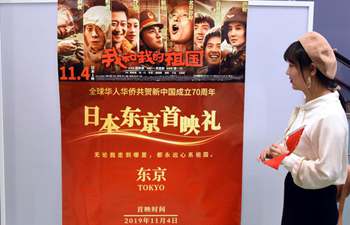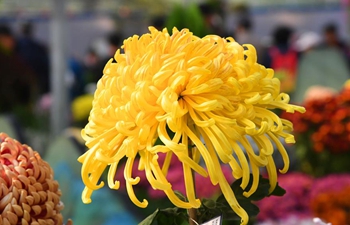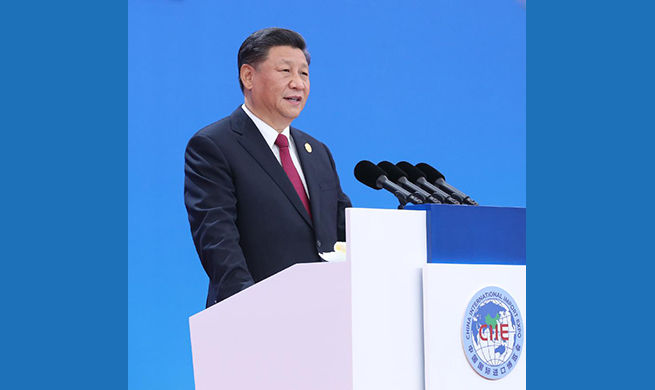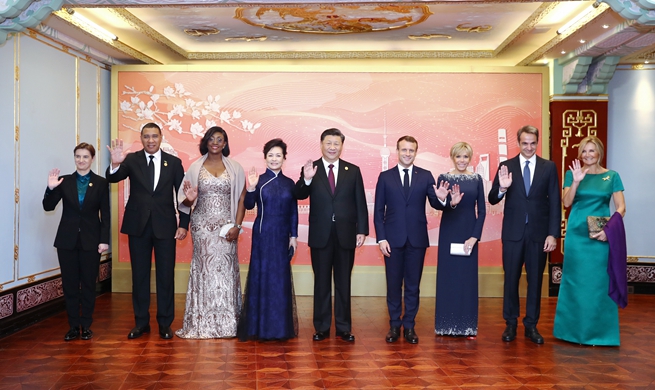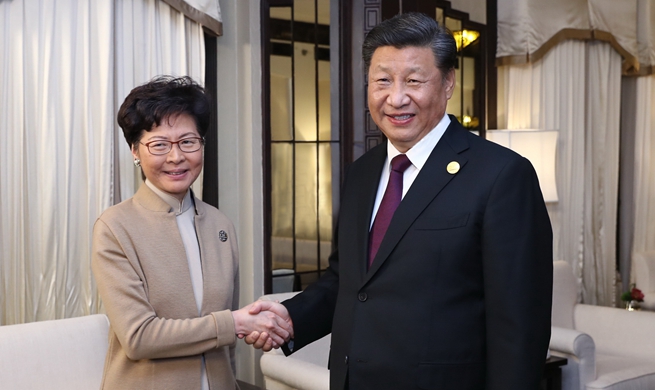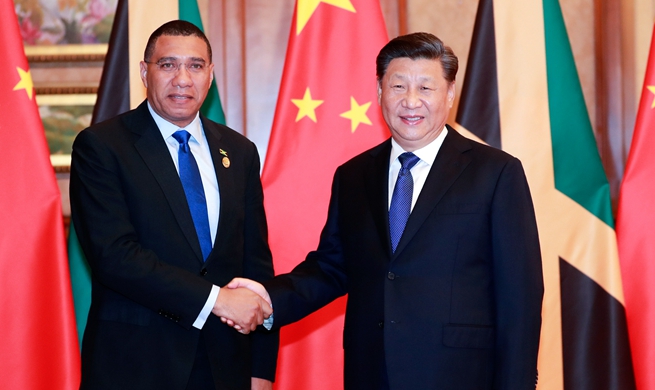TOKYO, Nov. 5 (Xinhua) -- Japanese Foreign Minister Toshimitsu Motegi on Tuesday intimated that there may not be much to be deduced from impromptu talks held between Japanese Prime Minister Shinzo Abe and South Korean President Moon Jae-in a day earlier.
Amid strained ties between both countries owing to a bitter wartime labor dispute that has spilled over into a tit-for-tat trade spat, the two leaders sat down for a 10-minute conversation in Bangkok, ahead of a summit between leaders of the Association of Southeast Asian Nations (ASEAN) plus Japan, China and South Korea, foreign ministry officials said.
The brief encounter marked the first time the two leaders have held sit-down talks since December last year, Motegi suggested though that not too much should be read into their conversation.
"We shouldn't give too high an evaluation of this 10-minute conversation," Motegi told a press briefing on the matter in Tokyo.
Sources close to the matter said that Abe, during the impromptu talks, responded to Moon proposing high-level dialogue be held between Tokyo and Seoul aimed at improving the current discord which has affected trade and military ties between the two countries, by restating that diplomatic channels should be kept open and utilized.
Motegi however played down the significance of the talks, stating that "substance" was more important than the "level" of dialogue.
"Honestly, it's not so much a matter of the level of the dialogue, but rather the substance," said Motegi.
Japan and South Korea have seen bilateral ties sink to their lowest level in recent years following South Korea's top court last year ordering Japanese firms to pay compensation to forced laborers during Japan's 1910-1945 colonial rule of the Korean Peninsula.
Japan, for its part, has claimed the rulings are not in line with international law and run contrary to the foundation of friendly and cooperative relations between the two neighbors since the 1965 normalization of diplomatic ties.
Japan maintains the matter of compensation for wartime labor was "finally and completely" resolved under the pact.
As tensions escalated between both sides, Japan hit back with tighter export controls on some materials used in high-tech products by South Korean firms, including some essential for use in smartphone displays and chips, mainstays of South Korea's tech-forward economy and integral to some key supply chains that flow from Japan and through South Korea onward.
With the diplomatic rift widening between the two neighbors, Japan went on to remove South Korea from its "whitelist" of nations entitled to simplified export control procedures, with the removal of South Korea from the list marking the first time Japan has revoked a countries' trusted trade status.
Seoul had been on the "whitelist" since 2004 and had been guaranteed preferential treatment in terms of importing certain products from Japan.
South Korea retaliated by taking Japan off of its own "whitelist" of trusted trade partners and announced tighter restrictions on certain imports from Japan, including coal ash and some waste recycling materials.
South Korea followed up by announcing its decision to scrap the General Security of Military Information Agreement, or GSOMIA, with Japan, on exchanging classified military information, as the tit-for-tat dispute escalated.
The GSOMIA pact between both sides, signed in 2016, had enabled the two neighbors to share military information and has helped both sides to counter potential regional threats.
But in a sign that tensions between both sides could potentially thaw in the future, aside from Abe and Moon talking for the first time since last December, Abe also held talks with South Korean Prime Minister Lee Nak-yon last month, marking the highest-level talks held between both countries in more than a year, at the time.
During a meeting between Japanese and South Korean lawmakers last Friday, meanwhile, both parties agreed in principle that more dialogue and work in general was necessary to break the current statement and ease tensions.
"Our role is to build a framework of cooperation, not conflict. Now we must make the correct choices that will enable us to break the stalemate and find a path toward resolution," Fukushiro Nukaga, leader of a nonpartisan group of lawmakers here committed to promoting friendly ties between Japan and South Korea, told a meeting with South Korean lawmakers at the Diet building in Tokyo.
Kang Chang Il, his opposite number in South Korea, said that while ties remained strained with the wartime labor dispute impacting the two countries' trade relations, the continuation of dialogue remains paramount.
Bilateral ties are "in a difficult situation, as what was a dispute over history has spread to economic and security areas. In order to resolve the dispute over history, we must continue dialogue," said Kang.

